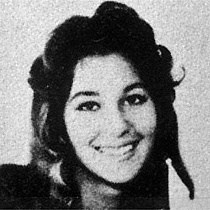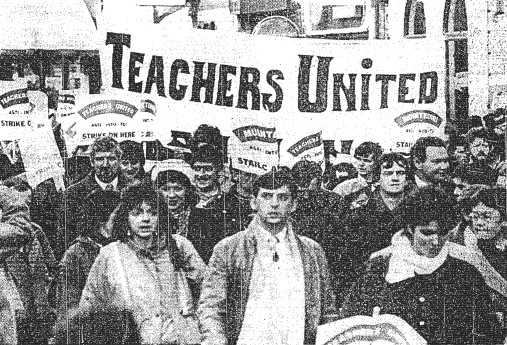Theresa Flynn
(b Dublin, 13 Aug. 1929; d Dublin, 19 June 1970).
Pianist, Teacher.
Theresa Flynn is known today primarily as both teacher and political agitator. Flynn studied Music and English at University College Dublin from 1948 to 1952, going on to gain an M.A. at the same College in 1954. Flynn taught piano and theory at the Municipal School of Music in Dublin (now the DIT Conservatory Of Music And Drama) for three years after graduation, spending much of the rest of her career from that point as a teacher at the Royal Irish Academy of Music.
Having always espoused comparatively radical pedagogical methods in her career as a teacher and educator, Flynn’s election to the board of governors of the RIAM in 1961 allowed her to influence Maude Aiken and other figures’ adoption of a more wide-ranging and inclusive curriculum. However, Flynn’s ambition to push the RIAM and other institutions into wider public participation and socially responsible recruitment was to be unsuccessful in the face of a craven musical and political establishment.
Flynn encouraged students to move outside the strictures of requirements. This can be seen in her two early-1960s books of exercises for recorder based on Irish folk tunes, Playful Studies for Treble Recorder, which loosely adapted tunes such as ‘Washerwoman’s Pardon’ and ‘Crumlin Air’ for solo recorder and ad lib percussion, with accompanying text giving various theatrical, experimental options for realisation of the notation. These studies circulated widely in Germany and then France following a visit to the Royal Irish Academy in 1964 of a delegation from the Hanover Female Music Teacher’s Group. Relatedly, a lawsuit was even proposed in 1982 by the Studies’ publishers, Granthum Mighty, pointing out suspicious similarities between the main theme of Part 4 of Jean Michel Jarre’s Oxygène and one of Flynn’s studies (the reader is invited to compare the attached contemporary recording of the study in question, No. 7 – ‘Dandy’s Lament,’ to Jarre’s piece), although lack of concrete forensic musicological evidence meant that the case did not make it to court.
Study no 7 Dandys Lament – Theresa Flynn
Flynn’s commitment to radical teaching and repertoire was such that she even sent brave pianists to compete at Feis Ceoil competitions with graphic scores from Morton Feldman, Earle Brown and marginal Irish composer Brian Faher that directly contradicted the given Feis syllabus (see Harty 2004, which describes Grainne O’Shaughnessy’s 1961 performance of Faher’s Moon Image 7). This emphasis on early forms of critical pedagogy was matched in Flynn’s wider political commitments. Flynn was an active member of the Irish National Teachers’ Organisation throughout her career (see image of Flynn on a INTO and ASTI march in 1965), and regularly assembled staff and even students at the RIAM to join her in union branch meetings and other political actions.
Despite Flynn’s popularity with students – Harty quotes one former student, Donal Soye, saying that Flynn’s class ‘made him see an affinity between life and art,’ and even led to him becoming a political campaigner for environmental causes in later life (2004: 45) – she was sacked from the RIAM in July 1968. This sacking happened after Flynn attempted to perform John Cage’s 0’00” in the main hall of RIAM. This action was executed, in Flynn’s own words as quoted by Terence Brown, ‘in homage to the student demonstrations of May 1968, whose total commitment to the possibility of the current moment was so spinelessly hammered down by a society in fear for its life, in fear for a world in which it had learned how to win’ (Brown 2010: 513). Flynn destroyed a grand piano in the main hall of the RIAM with a blunt hammer as part of this performance of 0’00’’, to the meek cheers of students and the apparent befuddlement of other teachers.
The extremity of this 1968 action, though the first to get her sacked, was almost matched by Flynn’s attempts to organise a ‘happening’ at the RIAM in 1966 (surely a first nail in her coffin), and, later, by her Austin Currie-inspired ‘sit-in’ in January 1969 in the flat of a Dublin single mother being evicted for alleged social impropriety. This latter action is as described in a 1970 letter to the Irish Times written by Jim O’Flaherty, a letter whose decrying as a scandalous reflection of the myopic horizons of Irish intellectual life of the lack of coverage both of Flynn’s 1968 sacking and her death two years later from bowel cancer might in fact be seen as an fitting epitah for Flynn – she always having been a lone voice for unpopular views within large Irish institutions after all.
In recognition of her achievements as an educationalist, and in spite of the sad neglect into which she was already falling at the time, the Order of Merit of the Federal Republic of Germany was conferred on Theresa Flynn in 1976.
SELECT BIBLIOGRAPHY
Andrews, Helen. 2016. ‘Flynn, Theresa,’ in Dictionary of Irish Biography, Vol. 3, Cambridge University Press.
Brown, Terence. 2010. Ireland: a Social and Cultural History 1922-1985, Harper Perennial.
Embassy of the Federal Republic of Germany, Dublin, Archives.
Flynn, Theresa. 1962 and 1963. Playful Studies for Treble Recorder, Volumes 1 and 2. Dublin: Granthum Mighty.
Harty, Donald. 2004. ‘Radical figures and demure institutions,’ in Irish Cultural Revue, Vol. 4, May, pp. 37 – 49.
O’Flaherty, Jim. 1970. ‘Letter,’ in The Irish Times, 31 November.
Pine, Richard and Charles Acton eds. 1998. To talent alone: the Royal Irish Academy of Music 1848–1998, Dublin: Gill and Macmillan.
Royal Irish Academy of Music. Minute books and administration volume 1856–1955, available at the National Archives.


